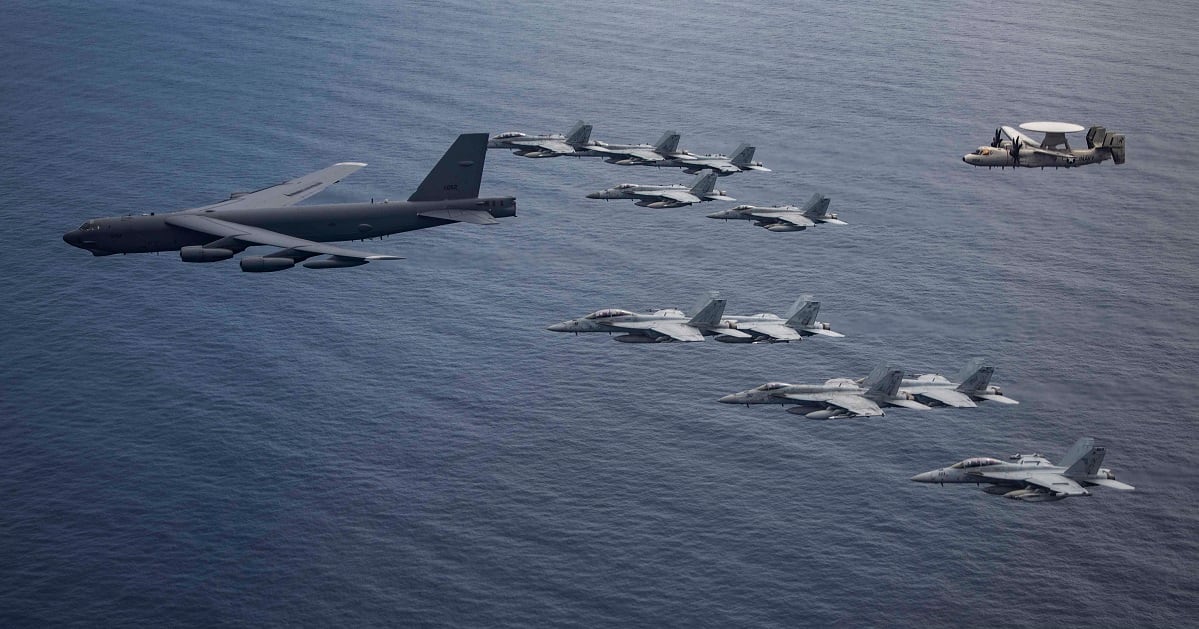A day after the White House announced it would reject nearly all of China’s maritime claims in the South China Sea, the U.S. warship Ralph Johnson steamed through the contested waters Tuesday, according to U.S. 7th Fleet officials.
The guided-missile destroyer navigated near the Spratly Islands, a network of islands and man-made atolls created by Beijing in recent years and militarily fortified to bolster China’s claims that such territory is theirs, not international waters.
But the United States and other western powers continue to contend the busy waters are international, resulting in displays like the Ralph Johnson freedom of navigation operation, known in mil-speak as a FONOP.
RELATED

In a statement, the Navy’s Japan-based U.S. 7th Fleet said Tuesday’s FONOP “upheld the rights, freedoms, and lawful uses of the sea recognized in international law by challenging the restrictions on innocent passage imposed by China, Vietnam and Taiwan.”
Several of the Spratlys are claimed by countries abutting the South China Sea.
“As long as some countries continue to claim and assert limits on rights that exceed their authority under international law, the United States will continue to defend the rights and freedoms of the sea guaranteed to all,” 7th Fleet said. “No member of the international community should be intimidated or coerced into giving up their rights and freedoms.”
U.S. policy has previously called for maritime disputes between Beijing and its neighbors to be resolved peacefully through international arbitration.
But Monday, Secretary of State Mike Pompeo said in a statement that the United States now sees virtually all Chinese maritime claims outside its internationally recognized waters to be illegitimate, the Associated Press reported.
RELATED

“The world will not allow Beijing to treat the South China Sea as its maritime empire,” Pompeo said, according to the AP. “America stands with our Southeast Asian allies and partners in protecting their sovereign rights to offshore resources, consistent with their rights and obligations under international law. We stand with the international community in defense of freedom of the seas and respect for sovereignty and reject any push to impose ‘might makes right’ in the South China Sea or the wider region.”
Monday’s change to U.S. policy in the South China Sea comes after two carrier strike groups joined by an Air Force B-52 bomber operated together in those contentious waters earlier this month.
Those movements prompted outrage from Beijing and veiled threats in reference to the country’s so-called “carrier killer” missiles.
Tensions between Washington and Beijing continue at a heightened state over several other issues, including the coronavirus pandemic, China’s policy in Hong Kong and Tibet, trade and human rights.
China accused the U.S. on Tuesday of trying to sow discord between China and the Southeast Asian countries with which it has long-standing territorial disputes in waters that are both a vital international shipping lane and home to valuable fisheries.
“The United States is not a country directly involved in the disputes. However, it has kept interfering in the issue,” the Chinese Embassy in Washington said on its website. “Under the pretext of preserving stability, it is flexing muscles, stirring up tension and inciting confrontation in the region.”
Other governments avoided direct comment on the U.S. announcement. The Philippine presidential spokesperson, Harry Roque, noted that the two powers would woo his country as they escalate their rivalry, but “what is important now is to prioritize the implementation and crafting of a code of conduct to prevent tension in that area.”
James Chin, head of the Asia Institute at the University of Tasmania in Australia, said the U.S. stance was nothing new because it has always rejected China’s “nine-dash line,” as its claim to the South China Sea is known.
“What is new is that Trump has sort of made the South China Sea a new focus point for his confrontation with China,” he said.
Both Indonesia and the Philippines joined Pompeo in calling on China to abide by an international arbitration court ruling in 2016 that disqualified many of China’s claims.
Malaysia’s foreign ministry declined to comment.
Chinese foreign ministry spokesperson Zhao Lijian reiterated China’s position that it has had effective jurisdiction over the islands, reefs and waters of the South China Sea for more than 1,000 years.
He said at a daily briefing Tuesday that China is not seeking to build a maritime empire.
Information from the Associated Press contributed to this report.
Geoff is the managing editor of Military Times, but he still loves writing stories. He covered Iraq and Afghanistan extensively and was a reporter at the Chicago Tribune. He welcomes any and all kinds of tips at geoffz@militarytimes.com.




